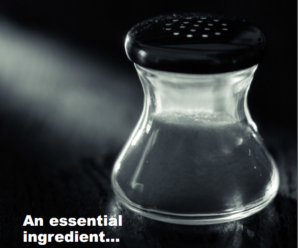 Ye are the salt of the earth: but if the salt have lost his savour, wherewith shall it be salted? It is thenceforth good for nothing, but to be cast out, and to be trodden under foot of men. (Matt. 5:13)
Ye are the salt of the earth: but if the salt have lost his savour, wherewith shall it be salted? It is thenceforth good for nothing, but to be cast out, and to be trodden under foot of men. (Matt. 5:13)
How can a person become salt?
Salt in all its utility is most commonly and essentially used for taste: an attribute that makes it an essential ingredient. Sans salt there is taste that does not appeal to our savoring buds. But the question is how can a person become such an essential ingredient for the curry that has to be enjoyed by all? The answer is there in itself; Biblical examples have one great thing about them that they don’t require to start onto a philosophical pursuit to get its meaning. They are easy; they are childlike, apt and have the power to transform. Salt mixes well with the ingredients it is added to. It does not initiates reaction that may harm the overall state of the ingredients it is added to. It mixes so well that no traces of its existence can be seen by naked eyes, but, it retains its individuality in terms of taste. Nothing on earth can replace salt. It is one such thing, so easily available and yet so important. I don’t think that it has ever claimed its importance in terms of price rise of house-hold commodities. Now, let us juxtapose ourselves to the salt thing. We live in the society, in perfect harmony. We mix with them well and try to be one like them. But then what about our individuality? When attempting to prove our individuality we dissociate ourselves, we stand apart as a different being and revolt against others. Learn from salt, what it does; it mixes well and at the same time retains its individuality. This can only happen when you are unique at the very core of your being, like salt. For your individuality you don’t have to occupy or encroach someone else’s domain of freedom, you need not to make others feel down but have to add on to the taste on the whole. Salt as mixed in curry does not push other ingredients out (in the sense their qualities, their flavors etc.) rather it’s only an additive that gives taste.
More so, salt never expects praises for the taste in the curry, or, we never give credit to salt for a tasty curry rather we commend the spices. Though we can easily imagine what a curry would be sans salt or a little disproportionate amount in seasoning of salt. When we do something commendable we want all the credits, even for the things we have not done, we become spices. And, see the universality of its appeal; throughout the world in all the variety of culinary preparations it is but an essential ingredient. Nobody imagines a tasty food without salt; no kitchen is complete without a pot of salt in a specific corner of the kitchen. No one notices this pot in particular but it never loses its importance. It is most commonly found on the dining table too, overlooking its presence is but common still it finds its place on the table.
What a perfect example of humility. Being so out of sight one can be as important as the salt, because his humility would not allow him to crave for primary place, crave for publicity or crave for credits. He will know his importance and won’t wait or expect recommendations. He will lay, maybe in a corner, never expecting the importance of spices and then too making the whole thing tasty. Salt with all its capacities mentioned above, is a cleanser, and is a preserver too. Can we with all are capacities be like salt?
